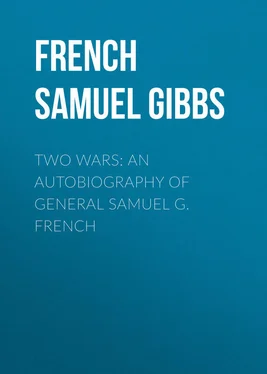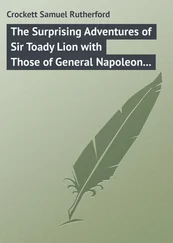Samuel French - Two Wars - An Autobiography of General Samuel G. French
Здесь есть возможность читать онлайн «Samuel French - Two Wars - An Autobiography of General Samuel G. French» — ознакомительный отрывок электронной книги совершенно бесплатно, а после прочтения отрывка купить полную версию. В некоторых случаях можно слушать аудио, скачать через торрент в формате fb2 и присутствует краткое содержание. Жанр: foreign_antique, foreign_prose, на английском языке. Описание произведения, (предисловие) а так же отзывы посетителей доступны на портале библиотеки ЛибКат.
- Название:Two Wars: An Autobiography of General Samuel G. French
- Автор:
- Жанр:
- Год:неизвестен
- ISBN:нет данных
- Рейтинг книги:4 / 5. Голосов: 1
-
Избранное:Добавить в избранное
- Отзывы:
-
Ваша оценка:
- 80
- 1
- 2
- 3
- 4
- 5
Two Wars: An Autobiography of General Samuel G. French: краткое содержание, описание и аннотация
Предлагаем к чтению аннотацию, описание, краткое содержание или предисловие (зависит от того, что написал сам автор книги «Two Wars: An Autobiography of General Samuel G. French»). Если вы не нашли необходимую информацию о книге — напишите в комментариях, мы постараемся отыскать её.
Two Wars: An Autobiography of General Samuel G. French — читать онлайн ознакомительный отрывок
Ниже представлен текст книги, разбитый по страницам. Система сохранения места последней прочитанной страницы, позволяет с удобством читать онлайн бесплатно книгу «Two Wars: An Autobiography of General Samuel G. French», без необходимости каждый раз заново искать на чём Вы остановились. Поставьте закладку, и сможете в любой момент перейти на страницу, на которой закончили чтение.
Интервал:
Закладка:
I shall not describe this battle. It was almost and altogether an artillery fight. Once the Mexican cavalry with two pieces of artillery under Torrajon made a detour to our right with a view of turning it, or capturing our wagon train. This movement was defeated by the Fifth Infantry and two pieces of artillery being sent to meet it. The infantry formed in square, and when the Mexican cannon were being loaded to fire on the square, Ridgely and I came up, and so quickly did we bring our guns into action that we unlimbered, loaded, and fired before the Mexicans could; in fact they did not fire a cannon shot, but retreated slowly back whence they came. Why they moved so doggedly slow under fire I could not tell; perhaps it was Mexican pride. Not long after this Maj. Ringgold, while sitting on his horse, was struck with a cannon shot, from the effects of which he died. Maj. Ringgold was an accomplished officer and an elegant gentleman, and his loss was a source of universal regret. Lieut. Ridgely succeeded to the command of the battery. The firing ceased about dusk. Our loss was only ten killed and forty-four wounded. Arista stated that his loss was two hundred and fifty-three. They turned their guns on our batteries; we fired at their infantry as instructed. During the night Arista fell back to a strong position on the banks of a dry bed of a stream about thirty yards wide called Resaca de la Palma. It runs through a wood with a dense undergrowth of chaparral, the woods on either side being perhaps a mile wide. From the prairie on which the battle of Palo Alto had been fought the road enters the woods that border the Resaca, crosses it, and leads on to Matamoras.
Early on the morning of the 9th Taylor sent Capt. McCall with about two hundred men in advance to discover the position of the enemy. He found them in force at Resaca, returned, and so reported to the general commanding.
There have been men who create occasions and avail themselves of the circumstances arising therefrom; but man generally is the creature of circumstance, and I mention this because it has an application to persons who were engaged in this day's battle. From Gen. Taylor down no one in this army had had much practical experience in the art of war, and from practice knew but little of the peculiar province of each arm of the service.
Because the artillery rendered such signal service on the field yesterday Gen. Taylor was impressed with the idea that it was available for pursuit of cavalry in mountain passes, for storming entrenchments, or charging a line of battle. Having discovered the position of the enemy, the General had the trains parked on the prairie and left in charge of a battalion of foot artillery and the two eighteen pounders. May's dragoons were held in reserve on the prairie near where the road enters the woods.
These arrangements completed, our battery, now under the command of Ridgely, was ordered to advance, take the road through the woods and chaparral, and attack the enemy. Here then was the singular tactics of a battery of horse artillery all alone, leaving the entire army behind, moving down the road through the woods without any support whatever. Capt. Walker was our guide. He and I and Ridgely were in advance. We had gone half a mile or more when crash through the tree tops came a shot from the unseen batteries in front. "At a gallop, march," was the order, and on we went until the road turned to the left about forty-five degrees. At the turn we halted, and this gave us a battery front (in part) to their guns near the bank of the dry river. We could not see their guns, nor they see ours, owing to undergrowth, but the guns were discharged at the smoke that each other made. We kept advancing "by hand" down the road. Their skirmishers now began to annoy us. Ridgely came to me and said: "Go to Gen. Taylor and ask him to send some infantry supports." I got on my horse and galloped back up the road at full speed, met Gen. Taylor, Maj. Bliss, and other staff officers in the road, and delivered the message. The reply was: "The infantry has been deployed and will soon be there." I returned at a run. No one was to be seen anywhere. We had now been fighting the enemy's guns alone for more than a half hour, and had driven them from off the plain into the ravine or dry bed of the river, and had obtained possession of an open camping ground directly in front of their pieces and not over a hundred yards distant. Again Ridgely came and said: "Go to Gen. Taylor as quick as possible, and tell him to send me assistance to capture the Mexican batteries in front of us." The road and also the woods on both sides were now full of our infantry moving forward. I soon met Gen. Taylor, delivered the message, adding: "General, their guns are just in our front and can be taken." His only answer was: " My! my! G – d, where is May? I can't get him up! " 8 8 The inference is that Gen. Taylor ordered May up on the receipt of Ridgely's first message.
Nothing more was said, and I returned. By this time our infantry was engaged with the enemy on the right of the road. The firing was very heavy. I had been back with my gun about ten minutes, when down the road came May, in column of fours; he halted and exclaimed: "Hello! Ridgely, where is that battery? I am ordered to charge it." Ridgely said: "Hold on, Charley, till I draw their fire, and you will soon see where they are." Our guns fired, and theirs replied. Away went May toward the Mexican guns, and our guns after him at a run. We came up to them muzzle to muzzle, only theirs were below the banks of the ravine and ours above. May had swept the gunners away and was out of sight on the other side in the chaparral. I was in command of the twelve-pound howitzer, and as I gave the order in battery, "Fire to the front!" a Mexican regiment behind some earthworks in the ravine and on the other side, with their right directly in front, fired a volley. Two drivers fell, the wheel locked the gun in turning, a horse fell, and it was with difficulty we could unlimber. I said to the sergeant, "Run for a canister," but before he got back a gunner slipped in a shell, and on top of that in went the canister. I could not prevent it, so great was the din of muskets. I fired the gun myself. The wheels were lifted from the ground. Two more canisters were fired before the regiment broke; but at that moment our infantry opened on them, and all was over in our immediate front. The second gun had horses killed, drivers and men shot, and it locked a wheel in the same way. Ridgely sprang from his horse and leaped into the dead driver's saddle, straightened the team, and that gun came into action. What the other two did I know not. Just as our firing ceased up rode Gen. Taylor with his staff, and complimented us. As he sat there on his horse May's men began to come back. A sergeant came up first and reported that he had captured Gen. La Vega; next an infantry officer came and reported La Vega was his prisoner; and then May returned and, riding up to Gen. Taylor, drew from a scabbard a sword. Taking it by the point, he presented it to the General with these words: "General, I have the honor to present to you the sword of Gen. La Vega. He is a prisoner." It was gracefully done. Taylor looked at it a moment and returned it to May. While we were all there in a group down the road came Duncan's battery and crossed the ravine. Ridgely could not stand that, and said to me: "French ask the General if we cannot cross over too." The reply was: "No, you have done enough to-day." Ridgely laughed, saying, "I can't receive orders from you;" and away he went with the guns after Duncan, leaving me to follow as soon as I repaired the damage to my gun. In a few minutes I crossed. No one halted me. I found Duncan firing away to the left and front, where it was reported troops were retreating. We soon moved on. At this time I saw a man hiding behind some bushes about twenty yards from the roadside. I went to him, and as my knowledge of Spanish had not been cultivated, I undertook to ask him his rank (seeing he was an officer), and tried to say to him: "¿Teniente o capitan?" It must have been badly pronounced, for he replied, "Si, senor," and, suiting action to the word, he put his hand in his pocket and handed me a biscuit. At that moment up rode Dr. Barnes and Capt. Kerr, and Barnes exclaimed: "Great heavens! French asked this gentleman for bread." No doubt the officer, who was an aid to Gen. La Vega, understood me to say: "¿Tiene usted pan?" ("have you any bread?"). Barnes, who afterwards became surgeon general of the United States army, declared to the end I asked that gentleman for bread, and never failed to tell the story on me in company.
Интервал:
Закладка:
Похожие книги на «Two Wars: An Autobiography of General Samuel G. French»
Представляем Вашему вниманию похожие книги на «Two Wars: An Autobiography of General Samuel G. French» списком для выбора. Мы отобрали схожую по названию и смыслу литературу в надежде предоставить читателям больше вариантов отыскать новые, интересные, ещё непрочитанные произведения.
Обсуждение, отзывы о книге «Two Wars: An Autobiography of General Samuel G. French» и просто собственные мнения читателей. Оставьте ваши комментарии, напишите, что Вы думаете о произведении, его смысле или главных героях. Укажите что конкретно понравилось, а что нет, и почему Вы так считаете.












